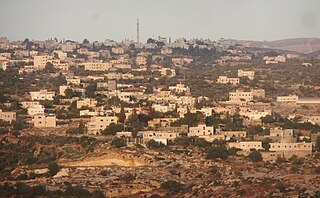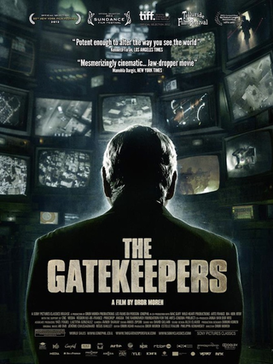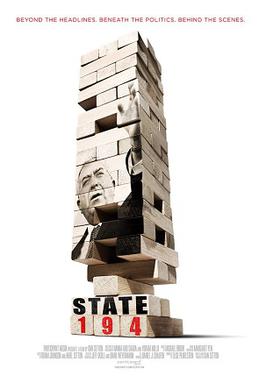
Emad Burnat is a Palestinian farmer and filmmaker, known for the documentary 5 Broken Cameras (2011). [1] [2] He is the first Palestinian nominated for the Academy Award for Best Documentary Feature. [3]

Emad Burnat is a Palestinian farmer and filmmaker, known for the documentary 5 Broken Cameras (2011). [1] [2] He is the first Palestinian nominated for the Academy Award for Best Documentary Feature. [3]
His documentary 5 Broken Cameras is a first-hand account of life and demonstrations in Bil'in, a West Bank village adjacent to Israeli settlements. The film was co-directed by Burnat and Guy Davidi, an Israeli filmmaker. The film is structured in chapters around the destruction of each one of Burnat's cameras and the film follows one family's evolution over five years of village upheaval.[ citation needed ]
Five Broken Cameras is a Palestinian-Israeli-French co-production. Both the personal style of the movie and, especially, Burnat's working with an Israeli filmmaker, has been controversial amongst the Palestinian community due to the ongoing boycott against Israel by Palestinians. The boycott, however, was never intended to include a boycott of Israeli activists and the problem stems from Israel having claimed the film as their own following its Oscar nomination in 2012. [1]
On February 19, 2013, he and his family were detained at Los Angeles International Airport, when customs officials refused to believe his reason for entry. [4] [5]
Although this was an unpleasant experience, this is a daily occurrence for Palestinians, every single day, throughout the West Bank. There are more than 500 Israeli checkpoints, roadblocks, and other barriers to movement across our land, and not a single one of us has been spared the experience that my family and I experienced yesterday. [6]
The Academy Award for Best Documentary Feature Film is an award for documentary films. In 1941, the first awards for feature-length documentaries were bestowed as Special Awards to Kukan and Target for Tonight. They have since been bestowed competitively each year, with the exception of 1946. Copies of every winning film are held by the Academy Film Archive.

The Israeli West Bank barrier, comprising the West Bank Wall and the West Bank fence, is a separation barrier built by Israel along the Green Line and inside parts of the West Bank. It is a contentious element of the Israeli–Palestinian conflict: Israel describes the wall as a necessary security barrier against Palestinian political violence, whereas Palestinians describe it as an element of racial segregation and a representation of Israeli apartheid. At a total length of 708 kilometres (440 mi) upon completion, the route traced by the barrier is more than double the length of the Green Line, with 15% of its length running along the Green Line or inside Israel, and the remaining 85% running as much as 18 kilometres (11 mi) inside the West Bank, effectively isolating about 9% of the land and approximately 25,000 Palestinians from the rest of the Palestinian territory.

John Greyson is a Canadian director, writer, video artist, producer, and political activist, whose work frequently deals with queer characters and themes. He was part of a loosely-affiliated group of filmmakers to emerge in the 1980s from Toronto known as the Toronto New Wave.

One Day in September is a 1999 documentary film directed by Kevin Macdonald examining the 5 September 1972 murder of 11 Israeli athletes at the 1972 Summer Olympics in Munich, Germany. Michael Douglas provides the sparse narration throughout the film.

Bil'in is a Palestinian village located in the Ramallah and al-Bireh Governorate, 12 kilometres (7.5 mi) west of the city of Ramallah in the central West Bank. According to the Palestinian Central Bureau of Statistics, Bil'in had a population of 2,137 in 2017. In the 2000s, it was known for its regular protests against Israeli occupation.

Hany Abu-Assad is a Palestinian-Dutch film director. He has received two Academy Award nominations: in 2006 for his film Paradise Now, and again in 2013 for his film Omar.

Cinema of Israel refers to film production in Israel since its founding in 1948. Most Israeli films are produced in Hebrew, but there are productions in other languages such as Arabic and English. Israel has been nominated for more Academy Awards for Best Foreign Language Film than any other country in the Middle East.

Lemon Tree is a 2008 Israeli-Palestinian drama film directed by Eran Riklis and co-directed by his cousin Ira Riklis. It stars Hiam Abbass, Ali Suliman, Danny Leshman, Rona Lipaz-Michael, Tarik Kopty, Amos Lavi, Lana Zreik and Amnon Wolf. The film describes the legal efforts of a Palestinian widow to stop the Israeli Defense Minister, her next door neighbor, from destroying the lemon trees in her family farm. At the same time, she develops a human bond with the minister's wife.
Ziad Doueiri is a Lebanese film director, cinematographer and writer. He is best known for his award-winning films West Beirut (1998) and The Insult (2017), a film that was nominated at the 90th Academy Awards, representing Lebanon in the Best International Feature Film category.
Events in the year 1988 in Israel.

5 Broken Cameras is a 94-minute documentary film co-directed by Palestinian Emad Burnat and Israeli Guy Davidi. It was shown at film festivals in 2011 and placed in general release by Kino Lorber in 2012. 5 Broken Cameras is a first-hand account of protests in Bil'in, a West Bank village affected by the Israeli West Bank barrier. The documentary was shot almost entirely by Palestinian farmer Emad Burnat, who bought his first camera in 2005 to record the birth of his youngest son. In 2009 Israeli co-director Guy Davidi joined the project. Structured around the destruction of Burnat's cameras, the filmmakers' collaboration follows one family's evolution over five years of turmoil. The film won a 2012 Sundance Film Festival award, it won the Golden Apricot at the 2012 Yerevan International Film Festival, Armenia, for Best Documentary Film, won the 2013 International Emmy Award, and was nominated for a 2013 Academy Award.

Orwa Nyrabia is an independent documentary film festival artistic director, producer, filmmaker, trainer, human rights defender and co-founder of DOX BOX International Documentary Film Festival in Syria. Nyrabia is a resident of Berlin, Germany, since the end of 2013 In January 2018 Nyrabia became the director of International Documentary Film Festival Amsterdam (IDFA).

The Gatekeepers is a 2012 internationally co-produced documentary film by director Dror Moreh that tells the story of the Israeli internal security service, Shin Bet, from the perspective of six of its former heads.

Iyad Burnat is a Palestinian activist who leads Bil'in's non-violent struggle in the West Bank. He is the head of the Bil'in Popular Committee against the Wall, which has led weekly demonstrations since 2005 against the Israeli West Bank barrier. He is also head of Friends of Freedom and Justice in Bil’in, a pro-Palestinian organization with the stated aims of building a "wide network of people from all over the globe who support Freedom and Justice for all"

State 194 is a 2012 documentary film about the pursuit for Palestinian statehood. The film is written, directed, and produced by Israeli filmmaker Dan Setton. The film premiered at the Toronto International Film Festival on September 10, 2012. It had a limited release in theaters in the United States on May 17, 2013.
Scandar Copti is a Palestinian filmmaker, film writer, actor and producer who examines social problems of Arab society in Israel through his film works.
Guy Davidi is an Israeli documentary filmmaker. His movie 5 Broken Cameras was nominated for the 2013 Academy Award for Best Documentary Feature. Davidi also won the Best Directing Award along with Palestinian co-director Emad Burnat in the 2012 Sundance Film Festival and the 2013 international Emmy Award as well as numerous awards worldwide.
Malcolm Clarke is an English documentary film maker. He began his career at the BBC, directing everything from the nightly news and documentaries, to game shows and music programming. He is now working for ARTeFACT Entertainment, a media company located in Shanghai, China, founded by Chinese producer Han Yi.
The Last Truck: Closing of a GM Plant is a 2009 documentary film, directed by Steven Bognar and Julia Reichert and produced for HBO Films. The film follows the closure of the Moraine Assembly plant, a General Motors automobile factory in Moraine, Ohio, on December 23, 2008.

The Wanted 18 is a 2014 Palestinian-Canadian animated documentary about the efforts of Palestinians in Beit Sahour to start a small local dairy industry during the First Intifada, hiding a herd of 18 dairy cows from Israeli security forces when the dairy collective was deemed a threat to Israel's national security. The film combines documentary interviews with those involved in the events, archival footage, drawings, black-and-white stop-motion animation as well as re-enactments, and was co-directed by Canadian filmmaker Paul Cowan and Palestinian visual artist and director Amer Shomali. The film was the Palestinian entry for the Best Foreign Language Film at the 88th Academy Awards but was not nominated.